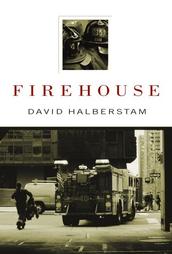 Originally published in Verbicide issue #7
Originally published in Verbicide issue #7
Hyperion, 201 pages, hardcover, $22.95
Related Posts
Anyone who knows me knows I can be unbearably insensitive and cynical, and I would never admit to crying about anything. (Not that I ever have.) But my insensitivity and cynicism only seems just that per se when it isn’t realized what has prompted me to act accordingly. I loathe sentimental novels and I don’t particularly enjoy having my emotions viscerally manipulated. At the end of Titanic, I laughed when everybody died. I can watch Faces of Death and laugh when someone gets shot in the face or jumps off a building. So when I opened up Firehouse and read what was written on the inside sleeve (a quotation from Frank McCourt), “If you have tears, prepare to shed them,” I scoffed a hearty scoff. “Man, it’s going to be one of those books,” I chuckled to myself. I gave the book a chance anyway; it was going to be a quick read and the photography on the cover looked nice. Why not? They say you can’t judge a book by its cover, but it’s all I could judge it by since laudatory quotations written on jacket sleeves weren’t going to do any sort of convincing.
The book covers the lives of the thirteen firemen of Engine 40, Ladder 35 who were on duty during the morning of September 11, 2001—all of whom but one perished. From its start, the reader is introduced to the culture of Engine 40, Ladder 35 (and even firemen in general) through an anecdote of the renovation of their firehouse. When the firemen moved back into it after renovations, they’re vehemently dissatisfied with it: “The architect, the men grumbled, had not known a damn thing about being a fireman or how firemen lived.” And as the book progresses, the reader will realize that this is a subtle jab at the civilian world—a world that doesn’t understand the culture of the fireman.
After the first chapter, I was impressed by its dispassionate narrative. It looked like that my heart wasn’t going to be clawed at for tears after all, so I felt safe.
Each chapter delves into the personalities of each fireman of Engine 40, Ladder 35—nuances and all. One of the first firemen we are introduced to is Captain Frank Callahan, the stern and taciturn officer who the firemen admired, feared, and respected. A captain who gave you The Look if you didn’t measure up to his standards on a particular fire. There’s also Jimmy Giberson, who, when he saw a man slapping a woman while shopping for groceries, jumped off the rig and held him in his enormous arms and instructed him that it was never going to happen again. Then there’s also Bruce Gary, the opinionated behemoth who smoked after lifting weights. And let’s not forget Steve Mercado, who loved stickball and was certain that the International Olympic Committee would recognize stickball and wanted his son Skylar to be a world-class stickball prospect.
In the back jacket of the book there are photographs of all the firemen who lost their lives, and with each fireman that each chapter introduced me to, I studied the photograph of the corresponding fireman and continued reading, bearing the face in mind. I studied a photograph every time I read about a nuance that made me laugh or an attribute that impressed me. After doing this an innumerable amount of times, 383 became so much more than a number or some statistic.
The book describes that tense moment for each of the firemen who were waiting for the call on the morning of September 11, 2001, each one knowing that they were going to die but run toward death regardless. After understanding the kind of people who become firemen and becoming intimately familiar with each one of Engine 40, Ladder 35—realizing and then knowing that these men ran in while everyone else was running out and that this is what they are born to do for every day of their lives—awe, admiration, respect, and anguish at their deaths welled up inside me a bit.
And it’s somewhere around there that I kept getting things in my eye. Fine. I’ll admit it. I almost cried. But it’s okay. Halberstam’s reportorial-like narrative didn’t work to elicit that response; it was all me. My emotions weren’t manipulated nor were my feelings jerked around. I cared because I wanted to care, not because I was convinced or even tricked into doing so.
When you put down this book, you’ll realize that you started out not knowing a damn thing about firemen, what they do, and what kind of person it takes to become one. And you still won’t, but you’ll have gained an inkling of insight into their lives, and that will be just the right amount to help you regain that childlike awe and respect you had for fireman as a child.